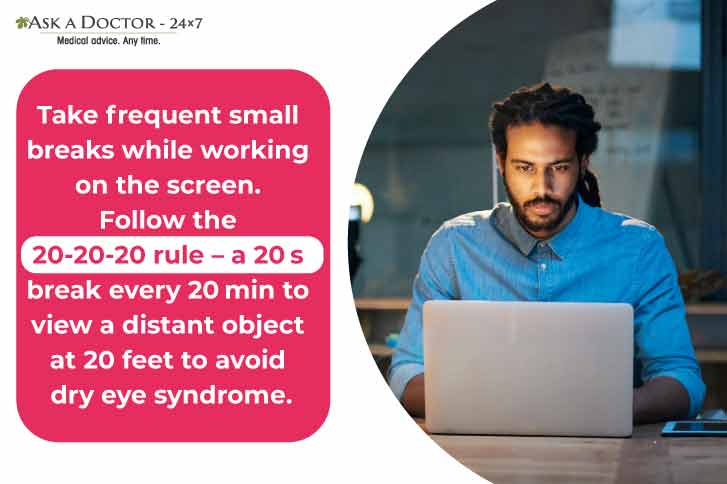7 Functional Remedies To Tackle Eye Infections And Flu During The Monsoon Season
The pitter-patter of raindrops fills hearts with delight for most people. Rain splash brings zeal to have fun with our loved ones, craving to eat delicious food, and desire to go for long drives to enjoy pleasant weather. Still, unfortunately, the rainy season is associated with high chances of getting microbial infections leading to some severe diseases. Some of the common ailments linked with monsoons are colds and flu, mosquito-borne diseases, diarrhea, and skin and eye infections.
LetŌĆÖs discuss some eye diseases that are more frequent during the rainy season and learn some functional measures that we can take to manage eye infection-related symptoms. But before we divulge to the remedies, let's identify some common eye infections that trouble mostly during monsoon.
Identify 3 Common Eye Infections That Trouble Mostly During Monsoon Season

1. Dry eye syndrome (Keratoconjunctivitis sicca): Humid weather during monsoons drives people to sit in air-conditioned rooms which may trigger dry eye disease (DED) symptoms. If you are more than 50 years old or a female, a regular contact lens user, or have a screen time of more than six hours; you are at a greater risk of getting dry eye problems.
Eye infections or poor eye health may also instigate DED symptoms. These symptoms can be temporary or chronic and appear due to insufficient tear production or excessive tear evaporation leading to inadequate lubrication of the eyes. Eye redness or itchiness, eye fatigue, blurry vision, or burning or stinging sensations in the eyes are common dry eye disease-related symptoms
2. Conjunctivitis: Also known as ŌĆśpink eyeŌĆÖ, conjunctivitis is the most common type of eye infection during monsoon season. Conjunctivitis can further be of two types: infectious or non-infectious. The infectious form is caused by bacteria or viruses and the non-infectious form is mostly allergic. Symptoms like redness, puffiness, haziness in eyes, and release of mucus or watery discharge are commonly seen among patients suffering from conjunctivitis. Conjunctivitis is caused due to swelling or inflammation of the conjunctiva, a thin mucous membrane that layers the inside of your eyelid and covers the white of your eye. The infectious form of conjunctivitis spreads through direct contact with the infected person.
3. Keratitis: If you are a regular contact lens user, be cautious about the hygiene of your lenses to prevent eye ailments, especially in monsoons. Unhygienic or damaged contact lenses are an immediate source of corneal infection or internal eye injury. In keratitis, the Cornea, a clear outer layer present in front of your eye covering the iris and pupil, may get inflamed due to microbial infection or an injury caused mostly due to improper use of contact lenses or getting any foreign body in the eye. Symptoms like eye redness and pain, blurred or decreased vision, or sensitivity to light ŌĆō photophobia are some of the common complaints of patients with keratitis.
Keratitis can further be of two types:
- Infectious or Microbial Keratitis-caused by bacteria, viruses, fungi, or other parasites
- Non-infectious Keratitis -caused due to scratch or injury in the eye. Corneal injuries may allow microbes to access and thus may further lead to infectious keratitis.
7 Functional Remedies to Tackle Eye Infection and Flu During Monsoon
.jpg)
1. Use honey: Honey is well-known for its antibacterial, anti-inflammatory, and antioxidant properties. It can be used as a functional remedy for treating eye infections too. Mix 1-2 teaspoons of honey in water and use it for washing your eyes. This can reduce the sensation of burning, swelling, or even pain in the eyes during infection and soothe the dryness in dry eye syndrome.
Note: Avoid putting honey directly into the eyes. This may aggravate eye infections.
2. Apply warm compress: It is an easy yet effective way to reduce inflammation and thus relieve swelling or other discomfort in the eye. Gently place a soft clean towel soaked in warm water over your eyelids; repeat this process 3-4 times a day for maximum benefit. This exercise opens the blocked or clogged oil glands in the eyelids to improve the symptoms related to dry eyes.
3. Infuse rose water drops: Using rose water as a beauty product is a conventional and common practice, but its antibacterial and antiseptic properties can also be used to relieve eye discomfort. Rose water brings a cooling and lubricating effect to the eyes besides cleaning all dirt and debris away. The anti-inflammatory properties bring relief from eye redness and puffiness. Apply rose water as eyewash by adding a few drops of it in clean water, spritzing it directly to the eyes, or placing cotton swabs soaked in it over the eyes.
4. Swab with fresh aloe vera gel: Aloe vera is another natural substance admired for its several health benefits. Aloe vera gel can be used to reduce eye inflammation, soreness, and dryness but donŌĆÖt apply it directly into your eyes rather use cotton swabs soaked in cold water infused with fresh aloe vera gel and place them over closed eyes for around 10-12 minutes. Repeat it for better results.
5. Rinse with saline or salt water: Rinsing your eye with salt water is a natural remedy to treat microbial infections. Wiping your eyes with a clean cloth or sterile cotton swab soaked in a sterile salt solution or putting it directly into the affected eyes works effectively to flush out all the debris and pus from the infected eye. Saline solution can be easily prepared at home by adding one teaspoon of salt to 1 liter of boiled and cooled water but it is always advisable to buy the sterile saline solution from the pharmacy store for use.
Note: If you are using a homemade saline solution, store it in an airtight container preferably in the refrigerator. Also, use it within 24 hours of preparation.
6. Place tea bags: Tea bags are also known for their anti-inflammatory properties and can be put to use to ease eye swelling or pain. Placing cooled green tea bags on closed eyes helps to relieve irritation and itching and using hot tea bags assists in releasing the pus accumulated during the infection. Hot tea bag compressions liberate tears from tear glands located in the eyelids and thus alleviate dry eye problems too.
7. Put cold compress: Cold compress is also effective in pacifying eye discomfort due to infection or dryness. A cold compress helps in reducing redness, inflammation, and swelling as it constricts the blood vessels around the infected area. A homemade cold compress made out of ice cubes wrapped in a clean towel or a refrigerated gel-filled pack can be used to alleviate eye-related symptoms.
Preventive tips for keeping your eyes healthy, especially during monsoon
- Always wash your hands before touching your eyes.
- Wash your eyes with clean and cold water before going to bed
- Disinfect and replace your contact lenses as per recommendations.
- Diligently remove makeup from your eyelids and eyelashes before bedtime, to prevent clogging of glands present at the base of your eyelashes.
- Do not share your spectacles, contact lenses, eye cosmetics, or towels with others
- Blink your eye more often while working on your laptop, computer, or using your smartphone.
- Avoid exposing your eyes directly to air conditioners or heaters to prevent them from dehydration.
- Adding nutritional supplements containing essential fatty acids may help to improve eye health.
In case you or your loved ones get infected by any of the eye infections, make sure to consult an eye specialist or ophthalmologist instead of starting with any self or OTC medication.
The eyes are the most beautiful asset gifted by god to humans. Being intricate in structure, eyes demand some extra care to stay healthy and thus let us enjoy colorful and vibrant surroundings. Following a simple eye health care routine every day could be a simple solution to many eye problems.
Immediately seek advice in case of any eye discomfort or vision-related concerns as avoiding it could lead to serious consequences. You can Consult an Ophthalmologist online at Ask a Doctor 24x7, anytime per your convenience.
Recently Answered Questions Related to Eye Infection
Ask a Specialist
Recent Questions


